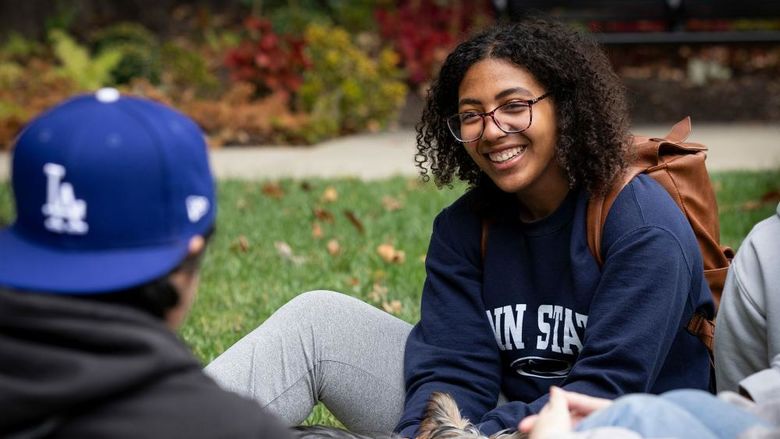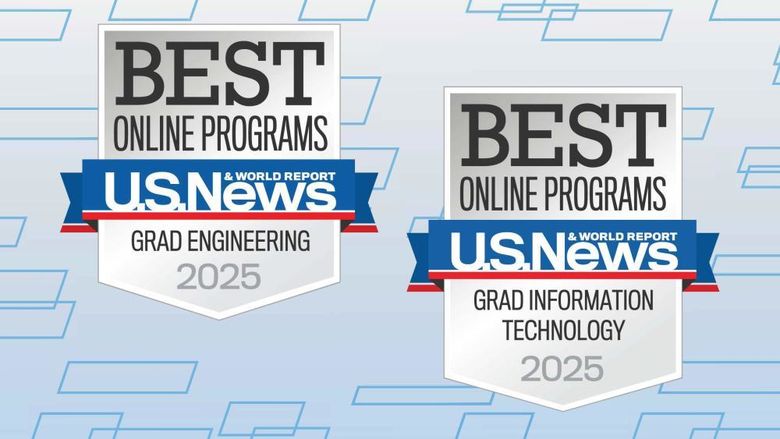
Penn State Great Valley student Daniel Kumankumah.
MALVERN, Pa. — Penn State Great Valley student Daniel Kumankumah found great success as a software engineering intern, but his journey included challenges and triumphs, beginning with the internship application process, he said. He applied to dozens of positions and was turned down — a natural part of the process, he knew, but still disappointing. He went to the gym for a kickboxing workout to relieve some stress and checked his phone just before he started. He saw an email from Amazon and tried not to get his hopes up too much.
But, when he opened it, he read, “You got the job!”
Weeks before, he had visited Amazon’s careers website and applied for a summer internship to complement his studies in Penn State Great Valley’s Master of Software Engineering program. Kumankumah, who is from the Netherlands, mentioned a Dutch saying that roughly translates to, “If you don’t shoot, you always miss.” Though he knew internships at Amazon were highly competitive, he decided to apply, he said.
In the Netherlands, Kumankumah said, people usually use multi-page curriculum vitae (CVs) for job applications. He met with Karen Carli in Penn State Great Valley’s Career Management Services, who helped him revise his CV into a one-page resume with standardized sections that highlighted his strengths.
Amazon invited Kumankumah to complete an online coding assessment and then a whiteboard session where they gave him a coding problem to solve and asked questions about his decision-making process. Finally, he interviewed with a recruiter who asked him about how his values matched the company's values. He spoke about how he enjoyed teamwork, which is one of the company's principles, and he shared an African adage: “If you want to go fast, go alone. But if you want to go far, go together.”
After he got the email announcing his acceptance, Kumankumah moved into a short-term rental he found in Seattle and began the internship onboarding process, learning about Amazon’s coding structure and built-in tools. His assignment for the summer was to expand a notification system built for Amazon Pharmacy so that it would work for other divisions within the company. Drawing on the software construction and requirements classes he had taken at Penn State Great Valley, Kumankumah set to work on a design document for the project, explaining his plan for modifying the system.
The team at Amazon reviewed his design document and returned it to him with about 60 questions, asking him to elaborate on and defend his decisions. At first, Kumankumah said, “I felt a bit discouraged.” He wasn’t expecting so many review questions, nor was he sure how to answer them. “I don’t know if I’m going to be able to hold on,” he thought. The 10 remaining weeks of his internship suddenly seemed daunting, in sharp contrast to the elation he had felt when he first got the internship.
But he remembered hearing during onboarding that internships often involved ups and downs like this. “You feel like you’re flying, and then you crash. You hit bumps, you get to the unknown. You just have to pull through,” Kumankumah said. He also shifted his perspective on the review: “It’s giving you opportunities to progress and become better at something,” he told himself.
He adjusted his software design plan and answered as many questions as he could. Setting aside his reluctance to ask for help, he discussed possible solutions first with his mentor and then with his whole team. He was pleased to discover how useful their ideas were when he felt stuck, he said. He returned the favor to them, researching new technologies that his team mentioned and asking where he could be a help to them.
His efforts with his team paid off. “Three days before the end of my internship, they made my code and my adjustment live,” Kumankumah said. “Amazon is using my code. I can be proud of that.”
Now that he has returned from Seattle, Kumankumah is doing his capstone project. “I love working on it,” he said, adding that the capstone requirement was one reason Penn State’s master’s program stood out to him. Learning from his internship experience, he is focusing on what the customer would want and pushing himself to structure the project well.
“It is always fun to see something that you make. It looks like nothing at the beginning, but then it turns out,” he said. “It excites me that you could make something that people really use.”





